- Home « Pre-Primary Period « Primary Debates « Fourth Debate: CNN/New York Times
Primary Debates
Tuesday, Oct. 15, 2019 in Westerville, OH.
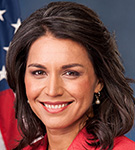 |
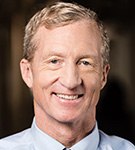 |
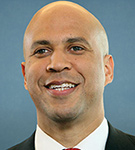 |
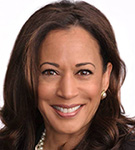 |
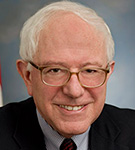 |
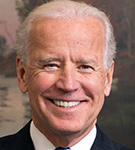 |
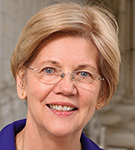 |
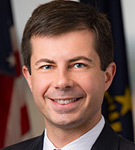 |
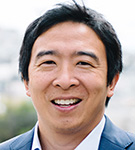 |
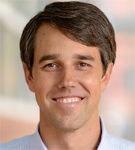
|
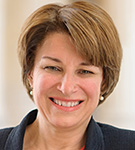 |
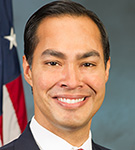 |
Gabbard |
Steyer | Booker | Harris | Sanders | Biden |
Warren | Buttigieg | Yang | O'Rourke | Klobuchar |
Castro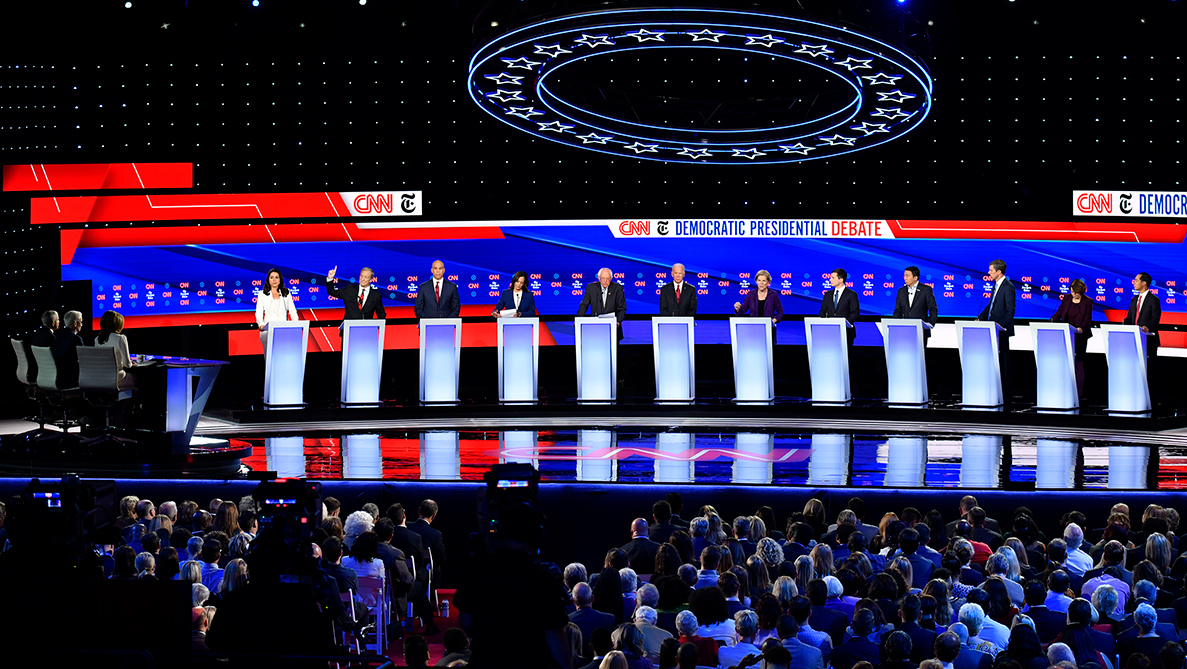 Photo: CNN
|
8:00
p.m. to 11:00 p.m. ET at Otterbein University in
Westerville, OH.
Sponsor:
CNN/New York Times.
Candidates: Biden,
Booker, Buttigieg, Castro, Gabbard, Harris, Klobuchar,
O'Rourke, Sanders, Steyer, Warren, Yang.
Moderators: CNN anchors Erin Burnett and Anderson Cooper and New York Times national editor Marc Lacey.
Audience: Determined by the
DNC.
Broadcast: "Exclusively on CNN, CNN International, CNN en Español, and stream on CNN.com's homepage and NYTimes.com's homepage. In addition, the debate will be available across mobile devices via CNN's and New York Times' apps for iOS and Android, via CNNgo apps for Apple TV, Roku, Amazon Fire, Chromecast and Android TV, SiriusXM Channels 116, 454, 795, the Westwood One Radio Network, Alexa Amazon, National Public Radio and stream on Facebook."
Format: 75 seconds to answer questions and 45 seconds for rebuttals. No opening statements.
Overview: The twelve candidates
on stage made this the biggest presidential primary debate
in history (the previous record was eleven (>)).
There were many strands coming
together in the lead up to this fourth debate. On
Sept. 24 House Speaker Nancy Pelosi announced launch of an
impeachment inquiry stemming from President Trump's phone
call with the president of Ukraine. Trump's decision
to pull U.S. troops out of Syria has increased instability
in an already volatile region and was much in the
news. This debate was Sen. Bernie Sanders' first
major appearance after his heart attack. Sen.
Elizabeth Warren, seen many as a (or the) frontrunner, was
being challenged on her support for
Medicare for All, including by Sen. Michael Bennet and
Mayor Pete Buttigieg.
As a (or the) frontrunner
Warren sustained a bevy of questions, many about how
Medicare for All would be paid for, and her response was
not as sharp as it should have been given that these
attacks were clearly coming. In one key exchange,
moderator Marc Lacey asked "you have not specified how
you're going to pay for the most expensive plan, Medicare
for all. Will you raise taxes on the middle class to
pay for it, yes or no?" After Warren avoided a
direct response, Lacey followed up. Warren stated,
"Costs will go up for the wealthy. They will go up
for big corporations. And for middle-class families,
they will go down." Buttigieg, next to speak,
declared, "No plan has been laid out to explain how a
multi-trillion-dollar hole in this Medicare for all plan
that Senator Warren is putting forward is supposed to get
filled in."
Warren spoke for
a total of more than 22 minutes, five to six minutes more
than Biden, while Klobuchar tallied the third most
speaking time. The debate marked a significant shift
for Buttigieg who adopted a much more assertive approach
than in the prior debates. Steyer, in his first
debate appearance, had the least total speaking time, a
bit over seven minutes.
| Warren |
Biden |
Klobuchar | Sanders |
Buttigieg |
O'Rourke |
Harris |
Booker |
Yang |
Castro |
Gabbard |
Steyer |
|
| ABC
News |
22:32 |
17:30 |
13:53 |
13:20 |
13:04 |
13:02 |
12:24 |
11:19 |
8:54 |
8:39 |
8:09 |
7:20 |
| CNN |
22:58 |
16:27 |
13:14 |
13:04 |
12:57 |
13:13 |
12:24 |
11:45 |
9:37 |
8:25 |
8:21 |
7:12 |
The debate attracted 8.3
million viewers on CNN and 9.4 million live streams.
The live stream comprised 4 million total live stream
starts on CNN and The New York Times’ digital platforms
and 5.4 million total live stream starts on The New York
Times and CNN Facebook pages.
Post-Debate
| Video
(2)
| Transcript
See also:
Eugene
Kiely, Brooks Jackson, Lori
Robertson, Robert Farley, D'Angelo
Gore, Jessica McDonald, Angelo
Fichera and Chelsey Zhu. "FactChecking
the October Democratic Debate." FactCheck.org,
Oct. 16, 2019.

